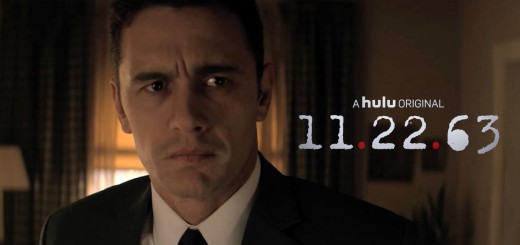THE HANDMAID’S TALE Season Two Review
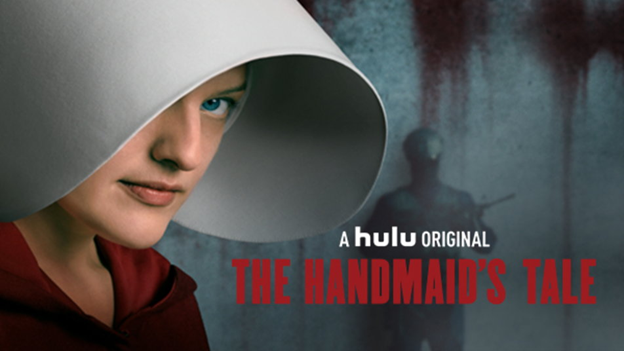
THE HANDMAID’S TALE is a difficult show to critique both because the scope of its 13 episodes is maddening and because it bleeds into the headlines, giving it a relevancy well beyond the realm of terrifying entertainment. The world of Gilead is a fictional totalitarian regime where fertile woman are forced to serve as handmaids for high-ranking infertile couples. It is a difficult story to adapt, as it must walk a razor-thin line. If it dwells too long in the darkness it becomes tragedy porn, but moments of hope can often feel contrived, especially when punctuated with a pop song. It is constantly wrestling with the damnation of its own premise and it fights to find its footing without the novel’s source material to lean on. Overall, it proves successful.
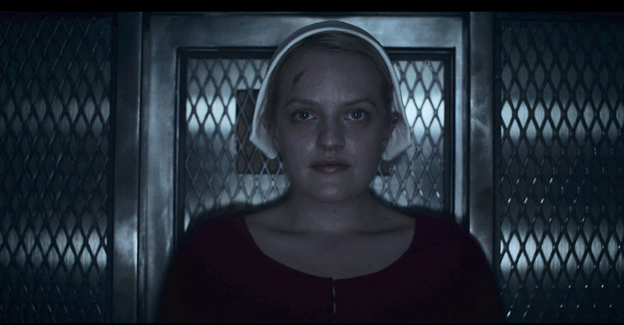
Minutes into Episode 201: 0
Minutes till certainty Elisabeth Moss will win another Emmy: 0
Image Source: Screenshot
The overarching theme of the second season is motherhood, and it yields some of the season’s best and most complicated material. June (Elisabeth Moss) reflects on her complicated relationship with her mother, Holly (Cherry Jones), a blazing second wave feminist, drawing on her strength to parent in impossible circumstances. This means preparing Serena to mother her own child, while simultaneously doing everything in her power to ensure that is not the case. The power dynamic between the two of them is a live wire. One moment they are locked in a reluctant alliance, the next June’s head is pressed outside Serena’s door, offering her comfort Serena can only resent her for knowing she needs. Serena’s ruthless: she torments June to further her own agenda, but she is also heartbroken and capable of self-sacrifice. Yvonne Strahovski is nothing short of a revelation in a performance that makes you forget all about Sarah Walker. Somehow she is able to do the impossible, because even though I am certain Serena doesn’t deserve it, I can’t help but want her to be saved from the very world she helped create.
But In THE HANDMAID’S TALE there are no weak links, just different ways to withstand trauma. June schemes and becomes a skilled manipulator, Emily (Alexis Bledel) maintains a quiet dignity and keeps her sense of injustice intact, even when sent to the Colonies (a radioactive wasteland where disobedient women are sent to die), and she does what she can to alleviate the pain and suffering around her. She also has this finely coiled rage that, despite her sense of self-preservation, keeps boiling over. Emily draws you into her world then gut punches you with her fury, making her easily my favorite character to watch.
Janine (Madeline Brewer), on the other hand, copes by purposefully disconnecting from reality. She survives moment to moment by finding beauty in a stray flower, the smattering of blood on the wall, reminding us that Gilead is as beautiful as it is harrowing. The visual poetry is stunning; meals are made out of red cloaks walking across the snow, a white sheet being pulled into place, a body’s slow descent into the bottom of the swimming pool. Brutality is visual currency, but thankfully, it also frames the moments of real hope which are truly moving. When Janine’s daughter, Charlotte, becomes deathly ill, in a rare act of kindness she is allowed to say goodbye. However, Janine stays with her through the night and the next morning she is perched on the windowsill, stripped down and singing to her daughter who laughs in her arms, surrounded by everything Gilead is not: casual, comfortable, tender. In the 11th hour June brings her daughter, Holly (later renamed Nichole), into the world. The realism and strength of the moment is laid bare and is unlike anything seen on screen before. Motherhood runs too deep to be commodified and the show is at its best when it taps into its power.
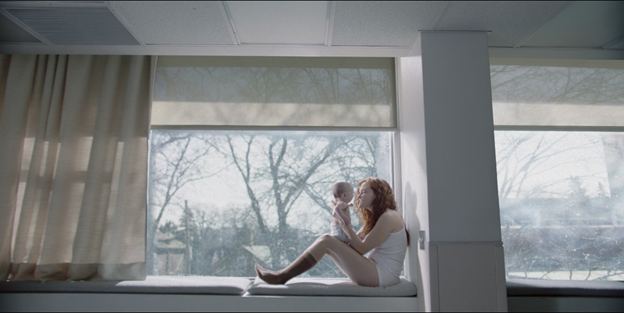
Janine and her daughter, Charlotte (known to her kidnapper parents as Angela)
Image Source: Screenshot
Other things, however, are less of a priority. The show’s handling of race remains its greatest failure. How could a world that’s so deathly sexist and homophobic not be at all racist? I can see how a fertility crisis paired with an America that is at least less obviously racist than it was in 1985 would allow women of color to serve as handmaids, and labor as marthas. However, people of color are shown across all ranks, including the very top tiers of government, communicating by proxy that Gilead is a colorblind society. It begs the question how a regime that brutally mutates a woman for being gay would not also see her as less than if she didn’t have Elisabeth Moss’ blonde hair. I don’t believe for a second that someone as powerful and prejudiced as Commander Waterford wouldn’t seek out a string of white (and pretty) Offreds to meet his fertility needs. It’s a complicated conversation that yields no one clear answer, but THE HANDMAID’S TALE has recused itself from having it on the premise of inclusivity. The result: we see a handful of stellar performances from gifted actors of color while the show conveniently ignores how their shared history of oppression would inform a current fascist regime. Historically racism, homophobia, and sexism have always intersected, especially in the states, and the show’s failure to acknowledge and explore this truth is an erasure of American history, rendering its totalitarian successor that much less of a conceivable reality.
The focus on June’s perspective also leaves precious little time to fill out the remainder of the narrative, and many of the other characters’ storylines suffer as a result. Eden (Sydney Sweeney) feels more like a sacrificial lamb than a fully-fledged person. She was first introduced as a tension between June and Nick (Max Minghella), and then represented some kind of perfect ideal of a true Gilead believer. The irony of that being her downfall was used as a catalyst to propel the action of the finale forward. Fred, on the other hand, is so predictably sinister he lacks dimension, especially when he stands in contrast to Bradley Whitford’s enigmatic new commander Lawrence, who is impossible to place.
Luke (O-T Fagbenle) and Moira’s Canada storyline was also entirely abandoned in the later episodes, a loss since Luke confronting the Commander, and later Nick, resulted in some of the most gratifying scenes. Moira, on the other hand, was inexcusably sidelined. Her trauma deserved more screen time. When she looked through cases of binders for her missing fiance, Odette (Rebecca Rittenhouse), this was a woman she was apparently with for years. However, save a save a stray mention in the first episode, Odette was never seen or referenced in any of the previous flashbacks, leaving Samira Wiley’s devastating performance reduced to Emmy-bait. Her nomination is well-deserved, but she should have had more to do.
While the plausibility of June ultimately deciding to stay behind in Gilead was widely contested, I, for one, believe it. I believe that she could not choose freedom, not with Hannah’s cries for her freshly ricocheting around and around in her brain. June’s seen just how powerful the underground martha network is and she knows how to play the system. Her final, red-hooded, sinister grin makes it clear that she is headed straight for the resistance: she may even end up leading it. I would follow that version of the show anywhere, but June’s decision comes at the price of her ordinariness, and thus the extent to which the audience can identify with her. So much of what makes the world of THE HANDMAID’S TALE so terrifying is how realistic the people caught in its crosshairs are, and I don’t see how June-The-Handmaid-Hero can maintain that same degree of believability.
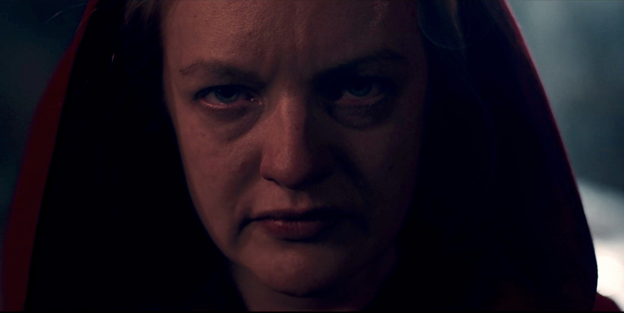
Blessed be the resistance
Image Source: Screenshot
Even so, THE HANDMAID’S TALE is impossible to dismiss. To do so is to not understand what it means to be a woman. Before we watched Hannah ripped away from her mother’s arms in currency with the child border separation policy, before Jeff Sessions used the Bible to justify it, before the recent Supreme Court vacancy put Roe v. Wade in jeopardy, THE HANDMAID’S TALE was relevant, and it has been relevant every year since it was published in 1985. Because as woman we’ve all known from far too young an age what it feels like to be watched by men in a way that makes you shiver. That makes you walk a little faster because you know you are being tracked with eyes that see you as a thing. Gilead has always existed in the realm of possibly, because we already live in a world where where he is given permission and you have to smile and pretend like nothing happened.
All the women I know have complex rules around watching it. We don’t watch at night, we never watch more than one at once, we watch in groups because we need the support, or we watch alone because it’s too personal. Either way, we watch. It’s a compulsion of a show helmed by a host of endlessly talented woman. It is also at times an upsettingly flawed piece of entertainment. But THE HANDMAID’S TALE captures the guttural female fear of subjugation and how to survive once it becomes a fully-realized reality better than anything on television has before. For better and worse, that lies at the heart of why I am unable look away.
Verdict: Recommend



